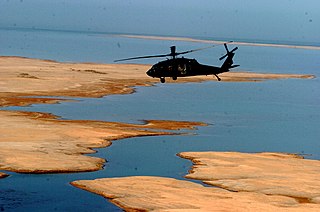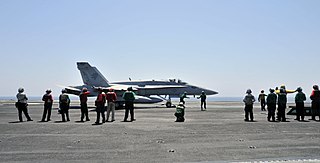Withdrawal of U.S. troops from Iraq
Last updatedThe withdrawal of U.S. troops from Iraq may refer to:
- Gulf War § The end of active hostilities
- Withdrawal of U.S. troops from Iraq (2007–2011)
- Withdrawal of U.S. troops from Iraq (2020)
| This disambiguation page lists articles associated with the title Withdrawal of U.S. troops from Iraq. If an internal link led you here, you may wish to change the link to point directly to the intended article. |
Related Research Articles

An insurgency began in Iraq after the 2003 US-led invasion, and lasted throughout the ensuing Iraq War (2003–11). The first phase of the insurgency began shortly after the 2003 invasion and prior to the establishment of the new Iraqi government. From around 2004 to May 2007, the insurgency primarily targeted the Multi-National Force – Iraq, while latterly Iraqi security forces, seen by Iraqi insurgents as collaborators with the coalition, were also targeted.

The withdrawal of U.S. military forces from Iraq began in December 2007 with the end of the Iraq War troop surge of 2007 and was mostly completed by December 2011, bringing an end to the Iraq War. The number of U.S. military forces in Iraq peaked at 170,300 in November 2007.
Opposition to the Afghanistan war stems from numerous factors, including the view that the U.S. invasion of Afghanistan was illegal under international law and constituted an unjustified aggression, the view that the continued military presence constitutes a foreign military occupation, the view that the war does little to prevent terrorism but increases its likelihood, and views on the involvement of geo-political and corporate interests. Also giving rise to opposition to the war are civilian casualties, the cost to taxpayers, and the length of the war to date.

The Iraq War was a protracted armed conflict that began in 2003 with the invasion of Iraq by a United States-led coalition that overthrew the government of Saddam Hussein. The conflict continued for much of the next decade as an insurgency emerged to oppose the occupying forces and the post-invasion Iraqi government. An estimated 151,000 to 600,000 Iraqis were killed in the first three to four years of conflict. US troops were officially withdrawn in 2011. However, following the spread of the Syrian Civil War and the territorial gains of the Islamic State of Iraq and the Levant (ISIL), the Obama administration decided to redeploy US forces to Iraq in 2014. Many former soldiers are employed by defence contractors and private military companies. The U.S. became re-involved in 2014 at the head of a new coalition; the insurgency and many dimensions of the civil armed conflict continue. The invasion occurred as part of the George W. Bush administration's War on Terror, following the September 11 attacks.

The Multi-National Force – Iraq (MNF–I), often referred to as the coalition forces, was a military command during the 2003 invasion of Iraq and much of the ensuing Iraq War, led by the United States of America, United Kingdom, Australia, Spain and Poland, responsible for conducting and handling military operations.

The Iraq Study Group Report: The Way Forward – A New Approach is the report of the Iraq Study Group, as mandated by the United States Congress. It is an assessment of the state of the war in Iraq as of December 6, 2006, when the ISG released the report to the public on the Internet and as a published book. The report was seen as crucial by Bush, who declared: "And truth of the matter is, a lot of reports in Washington are never read by anybody. To show you how important this one is, I read it, and [Tony Blair] read it."
Events in the year 2007 in Iraq.

On January 30, 2007, then-U.S. Senator Barack Obama introduced the Iraq War De-Escalation Act of 2007. The plan would have stopped the 2007 U.S. Troop Surge of 21,500 in Iraq, and would also have begun a phased redeployment of troops from Iraq with the goal of removing all combat forces by March 31, 2008. The bill was referred to committee and failed to become law in the 110th Congress.

Events in the year 2008 in Iraq.

The 2008 Turkish incursion into northern Iraq, code-named Operation Sun by the Turkish Armed Forces, began on February 21, 2008, when the Turkish Army sent troops into northern Iraq to target the Kurdistan Workers' Party (PKK). The ground offensive was preceded by Turkish Air Force aerial bombardments against PKK camps in northern Iraq, which began on December 16, 2007. This constituted the "first confirmed ground incursion" of Iraq since the 2003 U.S.-led invasion.
The U.S.–Iraq Status of Forces Agreement was a status of forces agreement (SOFA) between Iraq and the United States, signed by President George W. Bush in 2008. It established that U.S. combat forces would withdraw from Iraqi cities by June 30, 2009, and all U.S. combat forces will be completely out of Iraq by December 31, 2011. The pact required criminal charges for holding prisoners over 24 hours, and required a warrant for searches of homes and buildings that were not related to combat. U.S. contractors working for U.S. forces would have been subject to Iraqi criminal law, while contractors working for the State Department and other U.S. agencies would retain their immunity. If U.S. forces committed still undecided "major premeditated felonies" while off-duty and off-base, they would have been subjected to an undecided procedures laid out by a joint U.S.-Iraq committee if the U.S. certified the forces were off-duty.
Events in the year 2009 in Iraq.

United States Forces – Iraq (USF-I) was an American military sub-unified command, part of U.S. Central Command. It was stationed in Iraq as agreed with the Government of Iraq under the U.S.–Iraq Status of Forces Agreement. USF–I replaced the previous commands Multi-National Force – Iraq, Multi-National Corps – Iraq, and Multi-National Security Transition Command – Iraq from January 2010. General Lloyd Austin served as Commanding General. The logo of the USF-I depicts a lamassu.
Events in the year 2010 in Iraq.
Iraqi insurgency may refer to:

The American-led intervention in the Syrian Civil War refers to the United States-led support of Syrian opposition and the Federation of Northern Syria during the course of the Syrian Civil War and active military involvement led by the United States and its allies — the militaries of the United Kingdom, France, Jordan, Turkey, Canada, Australia and more — against the Islamic State of Iraq and the Levant (ISIL) and al-Nusra Front since 2014. Since early 2017, the U.S. and other Coalition partners have also targeted the Syrian government and its allies via airstrikes and aircraft shoot-downs.

An American-led intervention in Iraq started on 15 June 2014, when President Barack Obama ordered United States forces to be dispatched to the region, in response to offensives in Iraq conducted by the Islamic State of Iraq and the Levant (ISIL). At the invitation of the Iraqi government, American troops went to assess Iraqi forces and the threat posed by ISIL.

The Iraqi conflict (2003–present) is a long-running armed conflict that began with the 2003 invasion of Iraq by a United States-led coalition that toppled the government of Saddam Hussein. The conflict continued as an insurgency emerged to oppose the occupying forces and the post-invasion Iraqi government. The United States officially withdrew from the country in 2011, but became re-involved in 2014 at the head of a new coalition.

In December 2019, Iraq and the United States began discussing the partial withdrawal of American military forces from Iraq. In January 2020, following an escalation of tensions between the United States and Iran, the Iraqi Council of Representatives passed a non-binding measure to expel all foreign troops from their country, including American and Iranian troops. Following the vote, U.S. President Donald Trump initially refused to withdraw from Iraq.
Text is available under the CC BY-SA 4.0 license; additional terms may apply.
Images, videos and audio are available under their respective licenses.